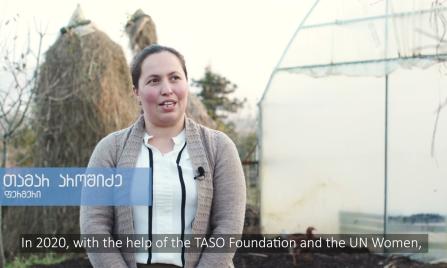-
Who We Are
WHO WE AREThe International Organization for Migration (IOM) is part of the United Nations System as the leading inter-governmental organization promoting humane and orderly migration for the benefit of all. IOM has had a presence in Georgia since 1993.
About
About
IOM Global
IOM Global
-
Our Work
Our WorkAs the leading inter-governmental organization promoting humane and orderly migration, IOM plays a key role to support the achievement of the 2030 Agenda through different areas of intervention that connect both humanitarian assistance and sustainable development. Across Georgia, IOM provides a comprehensive response to the humanitarian needs of migrants, internally displaced persons, returnees and host communities.
Cross-cutting (Global)
Cross-cutting (Global)
- Data and Resources
- Take Action
- 2030 Agenda
The United Nations Country Team (UNCT) in Georgia established the United Nations Network on Migration on 30 June 2020 to facilitate effective, timely, and coordinated United Nations (UN) system-wide actions supporting and contributing to migration management in Georgia. The Network will operate in line with the 2021-2030 Migration Strategy of Georgia.
Co-chaired by IOM and the UN Resident Coordinator’s Office, the Network fosters an understanding of migration dynamics and information exchanges and coordination within the UN system and with Government of Georgia entities and national stakeholders. The UN Network on Migration works closely with the State Commission on Migration Issues (SCMI) and all relevant Governmental entities, international organizations (IOs), non-governmental organizations (NGOs), civil society organizations (CSOs), and other entities dealing with migration issues in Georgia. The Network’s whole-of-society approach to migration governance supports the well-being of migrants and societies in a coherent, holistic, and balanced manner. It does so in line with the Global Compact for Safe, Orderly and
Regular Migration (GCM) and according to the Migration Strategy of Georgia and national legislation. In all its actions, the Network will be guided, inter alia, by the UN Charter, international law, and the 2030 Agenda for Sustainable Development and Sustainable Development Goals (SDGs), in addition to the GCM.
The Network’s operationalization and activities promote two important dimensions of the Global Compact: whole-of-government approach and whole-of-society approach. Migration is a multidimensional reality that cannot be addressed by one government policy sector alone. To develop and implement effective migration policies and practices, a whole-of-government approach is needed to ensure horizontal and vertical policy coherence across all sectors and levels of government. The Global Compact promotes broad multi-stakeholder partnerships to address migration in all its dimensions by including migrants, diaspora, local communities, civil society, academia, the private sector, parliamentarians, trade unions, national human rights institutions, the media, and other relevant stakeholders in migration governance. To this end, the Network is planning several workshops in the coming year for the State Commission on Migration Issues to facilitate the Government of Georgia’s active participation in GCM and to engage the civil society organizations in Georgia in the GCM process.
- The Global Compact for Safe, Orderly and Regular Migration
-
The Global Compact for Safe, Orderly and Regular Migration is the first inter-governmentally negotiated agreement prepared under UN auspices that holistically and comprehensively covers international migration. It is non-binding and respects States’ sovereign right to determine who enters and stays in their territory and demonstrates a commitment to international cooperation on migration. It aims to improve migration governance, address migration challenges, and strengthen the contribution of migration to sustainable development. GCM is framed with target 10.7 of the 2030 Agenda for Sustainable Development, in which Member States committed to cooperate to facilitate safe, orderly, and regular migration.
The GCM addresses the full migration cycle through 23 objectives and suggested courses of action, focusing on all migration dimensions and encouraging migration approaches that maximize benefits and minimize challenges for communities in countries of origin, transit, and destination, as well as for migrants. GCM implementation will require concerted efforts at the global, regional, national, and local levels. In Georgia, the established UN Network on Migration will support the implementation, follow-up, and review of GCM in Georgia.
- Migration Network Hub
-
The Migration Network Hub is the first knowledge platform and connection hub that supports UN Member States in the implementation, follow-up, and review of the Global Compact for Safe, Orderly and Regular Migration (GCM).
The Hub provides high-quality, curated content, analysis, and information on all aspects of migration as covered in the GCM. Peer review ensures quality control so content approved for inclusion is relevant, up-to-date and in line with the GCM and its guiding principles. Recognizing that building the capacity of Member States and other stakeholders plays an important step towards achieving its 23 objectives, the GCM called for the creation of the Migration Network Hub as part of a capacity-building mechanism that also includes the Migration Multi-Partner Trust Fund.
- Cooperation Framework and Migration Priorities
-
The United Nations Sustainable Development Cooperation Framework (UNSDCF) for 2021-2025 was signed on 2 October 2020 by the UN Country Team and the Government of Georgia. The UNSDCF outlines development cooperation priorities for Georgia for the upcoming five years, identified through a nine- month coordination process. The preparations considered the findings of the final evaluation of the previous programming cycle (2016-2020) and the development challenges identified in the Common Country Analysis (CCA). The resulting plan corresponds with national development priorities, including Georgia’s EU integration aspirations and the country’s international commitments under the 2030 Agenda.
Migration is reflected as a key cross-cutting issue, and IOM’s work over the next five years will contribute to all five outcomes of the UNSDCF.
